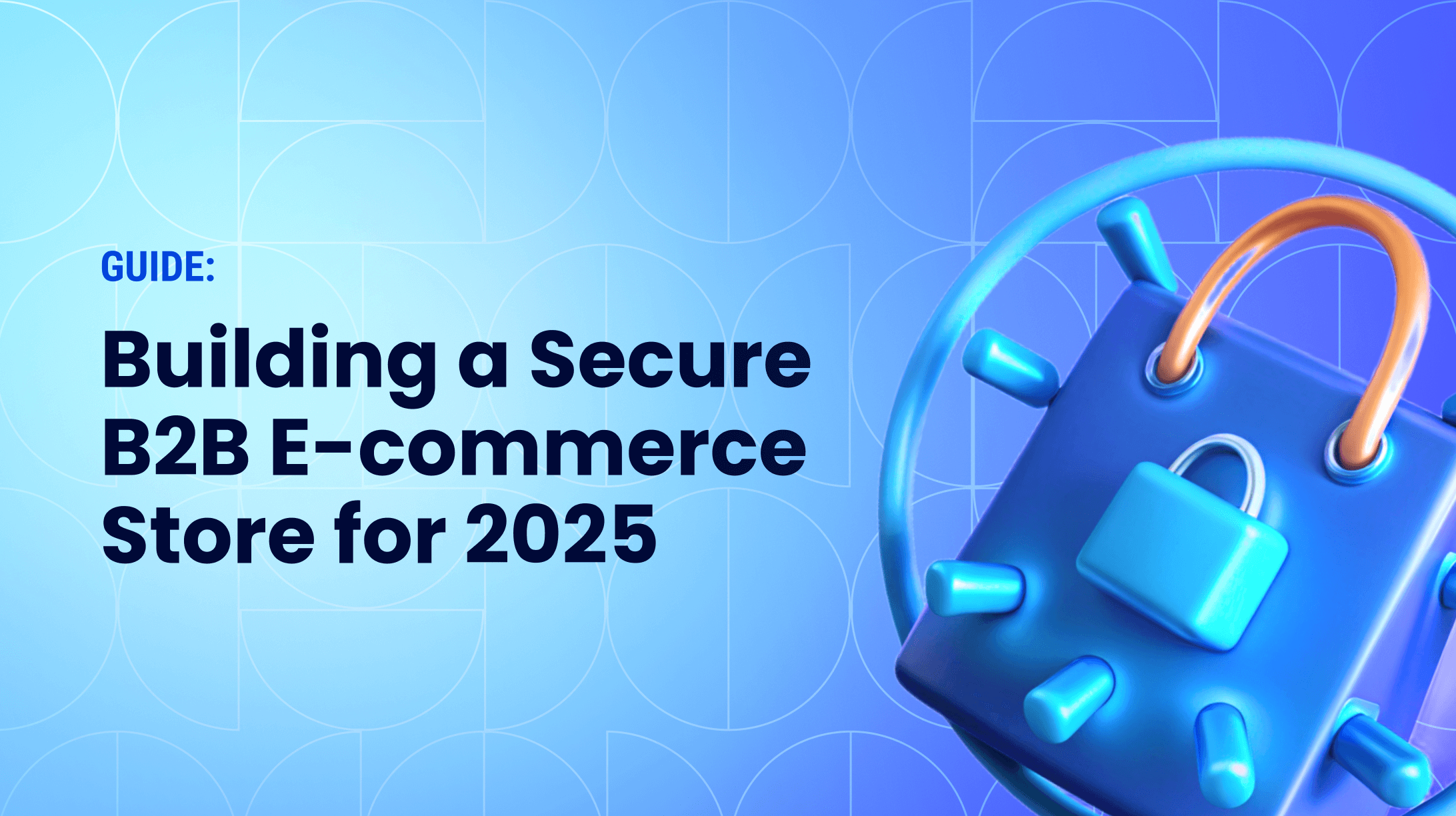0%

In This Article:
What is a Secure B2B Online Store?
Exploring B2B E-commerce Website Design
5 Steps for Secure B2B E-commerce Website Development
Advanced Functionality for B2B Stores
Main Security Challenges in B2B E-commerce (And How to Solve Them)
B2B E-commerce Best Practices for Data Protection
Securing Transactions on Your B2B E-commerce Website
Two-Factor Authentication for Your B2B Online Store
Global Data Privacy Regulations on B2B E-commerce Websites
Case Studies of Successful B2B E-commerce Stores
According to the IBM Security Report, cyberattacks have increased by 67% in the last five years, putting e-commerce platforms at risk.
With the rise of B2B e-commerce, businesses face the challenge of safeguarding vast amounts of sensitive data against increasingly sophisticated threats. Inadequate security measures can lead to data breaches, financial loss, and damage to your brand's reputation.
This article will help you build a secure B2B e-commerce store and covers important security measures, new technologies, and design tips to keep your e-commerce platform safe.
What is a Secure B2B Online Store?
A secure B2B online e-commerce store ensures that all transactions, data exchanges, and interactions are protected against unauthorized access and cyber threats.
It combines robust security protocols with user-friendly design to provide a trustworthy experience. Key elements include:
- Data Protection – Encryption and secure data storage practices.
- Secure Transactions – Use of trusted payment gateways and SSL certificates.
- User Authentication – Two-factor authentication to prevent unauthorized access.
- Compliance – Adherence to global data privacy regulations like GDPR and CCPA.
But before we move on to review B2B e-commerce best practices for security, let’s first have a glance at the development process of a B2B e-commerce store as a whole.
Exploring B2B E-commerce Website Design
A good B2B store starts with a good design. An effective B2B e-commerce web design needs a thorough understanding of user needs and business objectives.
Here’s how to achieve it:
- User-Centric Design – Create an intuitive interface that caters to B2B buyers who need quick access to bulk ordering and detailed product information. A streamlined layout with clear navigation helps users find what they need efficiently.
- Mobile Responsiveness – Optimize your website for mobile devices, ensuring B2B professionals can quickly access information on smartphones and tablets. A responsive design enhances accessibility and user satisfaction.
- Accessibility and Functionality – Include features that accommodate all users, regardless of technical abilities or disabilities. Ensure your design supports essential functionalities like advanced search filters, allowing users to locate products based on specific criteria.
- Branding Consistency – Align your website design with your brand identity to build trust and recognition. Consistent use of colors, fonts, and logos throughout the site reinforces brand professionalism and reliability.
5 Steps for Secure B2B E-commerce Website Development
To build a successful B2B e-commerce platform, follow a strategic approach with detailed focus on each step:
1. Define Business Objectives
Clearly outline your B2B platform's goals, focusing on specific outcomes like increased bulk sales and enhanced customer loyalty. Consider your target audience’s unique needs and ensure these objectives align with your business strategy.
2. Choose the Right Platform
Select the best B2B e-commerce platform that offers scalability and flexibility. Magento and Shopify Plus are popular options, but evaluate their ability to integrate with existing systems like CRM and ERP. Key features to prioritize include:
- Bulk pricing – Custom pricing tiers for different customers.
- Custom reporting – Detailed analytics for sales and inventory management.
- Robust inventory management – Real-time stock tracking and automated restocking.
- Multi-store and multi-language support – Essential for global operations.
- Extensive API ecosystem – Enables seamless integration with third-party solutions.
3. Develop a Secure Infrastructure
Choose hosting providers with advanced B2B security features as well as support for high availability and redundancy to minimize downtime and protect against data loss. Ensure your infrastructure includes:
- SSL certificates for secure transactions.
- Firewalls and DDoS protection to prevent cyberattacks.
- High availability architecture with redundancy to minimize downtime.
- Regular security patches to safeguard against vulnerabilities.
4. Implement Robust Security Measures
Deploy strong encryption standards and two-factor authentication. Regularly update your security infrastructure and conduct audits to ensure compliance with industry-specific regulations and standards, such as PCI DSS for payment security. We’ll talk more about this in the next sections.
5. Test and Optimize
Perform comprehensive testing, including usability testing with actual users. Gather feedback to identify areas for improvement. Use analytics tools to monitor performance and continuously optimize for speed and security.
Advanced Functionality for B2B Stores
B2B e-commerce platforms require more than just basic online selling features. Unlike B2C, where purchases are often one-time and impulsive, B2B transactions involve negotiated pricing, long-term relationships, and complex approval processes.
To stay competitive, you need advanced functionality that streamlines operations, improves efficiency, and enhances the customer experience. Here are some tips to follow:
- Integrate CRM and ERP systems to streamline operations, offering real-time insights into sales, inventory, and customer interactions. This integration enhances decision-making and customer service by providing a unified view of business processes.
- Implement bulk ordering, custom pricing, and approval workflows. These enable personalized account management and tailored order processing, addressing specific B2B customer needs and boosting efficiency.
- Utilize advanced analytics to keep track of sales trends, customer behavior, and market demands. Real-time reporting helps identify business opportunities and optimize strategies, ensuring your platform remains adaptable.
- Integrate robust inventory management systems to efficiently track stock levels and manage supply chain logistics. Real-time updates help prevent stockouts and facilitate the timely fulfillment of large orders.
Main Security Challenges in B2B E-commerce (And How to Solve Them)
Your B2B platform may deal with complex infrastructures and sensitive interactions. It's important to grasp these challenges to develop a secure platform that meets your stakeholders’ needs.
Complex Access Controls
In a B2B setting, various users – from buyers to administrators – require different levels of access. Detailed access management reduces unauthorized access risks, which allows only authorized users to handle sensitive data.
Solution: Develop a robust system to assign and manage user roles dynamically as your business needs evolve.
Sensitive Data Protection
B2B transactions often involve large data volumes, such as pricing, contracts, and personal client information. This requires robust encryption and data protection measures to prevent data breaches.
Solution: Implement strategies to separate and compartmentalize data, which minimizes the risk and impact of data leaks.
Supply Chain Risks
Many B2B platforms rely on third-party providers for various services, such as logistics and payment processing. These third-party connections can introduce vulnerabilities that need constant monitoring and management.
Solution: Establish protocols for assessing and managing vendor risks, including regular audits and compliance checks.
Now, let’s dive deeper into the four key aspects of B2B e-commerce website security, starting with ensuring data integrity.
B2B E-commerce Best Practices for Data Protection
B2B online stores face significant threats from data breaches, which may expose sensitive client and transaction information. System failures or attacks can lead to data loss, resulting in downtime and financial loss
Effective data protection in B2B e-commerce stores reduces risks, strengthens customer trust, and ensures regulatory compliance. Use robust encryption and secure storage techniques to combat these threats.
AES-256 Encryption
B2B workflows and online sales processes often involve confidential business agreements, bulk pricing, and financial details, making strong encryption indispensable. Advanced Encryption Standard (AES-256) is one of the strongest encryption methods available. It protects sensitive data both at rest (stored data) and in transit (data being transmitted).
Make sure to implement SSL/TLS for website encryption and use encrypted databases so that unauthorized parties cannot access or intercept sensitive information.
Role-Based Access Controls (RBAC)
RBAC enforces strict access permissions based on user roles within an organization. For example, B2B sales teams may only access customer order histories, while finance teams can view payment details.
Access control minimizes unauthorized data exposure and limits internal threats. To further enhance security by requiring additional identity verification, consider integrating multi-factor authentication (MFA) with RBAC.
Regular Security Audits
Frequent security audits help uncover vulnerabilities before they become major threats. Your B2B company should conduct penetration testing, monitor for unusual activity, and update security patches regularly.
Consider using automated threat detection tools, such as intrusion detection systems (IDS) and security information and event management (SIEM) solutions, to get real-time insights into potential risks.
Robust Backup Solutions
A comprehensive backup strategy ensures quick recovery in case of cyberattacks, hardware failures, or accidental deletions. Cloud-based backups with redundancy, combined with on-premises storage, offer resilience against data loss. Implement automated daily backups and test recovery processes regularly to guarantee business continuity with minimal downtime.
Continuous Employee Training
Human error remains one of the biggest cybersecurity risks. Training employees to recognize phishing attacks, social engineering tactics, and proper data handling procedures significantly reduces risks. Conduct simulated phishing tests and provide security awareness programs to ensure employees remain vigilant against evolving threats.
Securing Transactions on Your B2B E-commerce Website
In B2B e-commerce, transactions often involve high-value orders, recurring payments, and sensitive business information. Securing transactions protects this sensitive data and cultivates trust and a loyal customer base.
Here’s how to protect your online B2B business effectively:
Use Trusted Payment Gateways
Payment gateways act as the bridge between your online store and the financial institutions that handle your customers’ money. Choosing a reputable and reliable payment gateway is vital for several reasons:
- Data Encryption: Trusted gateways encrypt sensitive information, ensuring that customer details remain confidential and are only seen by those who are authorized.
- Fraud Detection: Many top-tier gateways offer advanced fraud detection and prevention tools, providing an extra layer of protection against fraudulent activities.
- Compliance: They are compliant with industry standards and regulations, such as PCI-DSS (Payment Card Industry Data Security Standard), ensuring your business meets necessary legal requirements.
- Reputation and Trust: Using well-recognized payment gateways can enhance your business’s credibility and reassure customers that their transactions are secure.
Implement SSL Certificates
Secure Sockets Layer (SSL) certificates are crucial for creating a secure connection between your web server and your customers’ browsers. Here’s why SSL is indispensable:
- Data Protection: SSL encrypts data in transit, protecting sensitive information such as credit card numbers and personal details from being intercepted by malicious actors.
- Authentication: It verifies the identity of your website, ensuring that customers are interacting with your legitimate business and not an impostor.
- SEO Benefits: Search engines like Google favor secure websites, so having an SSL certificate can boost your search engine rankings, driving more traffic to your site.
- Customer Trust: SSL certificates display a padlock symbol in the browser’s address bar, signaling to visitors that your site is safe, encouraging them to complete their transactions.
Two-Factor Authentication for Your B2B Online Store
As cyber threats become more sophisticated, passwords alone are not enough. Two-Factor Authentication (2FA) is not a silver bullet but it’s a helpful security tool, still. It adds an extra layer of protection by requiring users to provide two forms of verification: something a user knows, like a password, and something they possess, such as a smartphone or token.
How 2FA Functions
After an employee, customer, or partner enters their password, they must verify their identity with a second factor. This could be a code sent via SMS, an app-generated token, or biometric verification like a fingerprint. This additional step makes unauthorized access to your B2B store much more difficult, even if passwords are compromised.
With 2FA, your B2B shopping experience benefits from:
- Increased Security: An extra authentication step significantly reduces the risk of unauthorized account access.
- Higher Customer Trust: Clients prefer platforms that prioritize data security. Implementing 2FA demonstrates your commitment to their safety.
- Tailored Solutions: 2FA provides various options, allowing customization to fit your specific business needs.
- Regulatory Compliance: Many industries mandate enhanced security measures. Deploying 2FA helps you meet these standards and avoid potential penalties.
Get in touch
with our expert
Discuss your project requirements and get a free estimate.
Get in touch
with our expert
Discuss your project requirements and get a free estimate.
Global Data Privacy Regulations on B2B E-commerce Websites
For B2B online stores, compliance with data privacy regulations is important to ensure regulatory adherence. Non-compliance with regulations such as GDPR and CCPA can result in severe penalties, which include hefty fines and legal repercussions.
What’s more, failure to comply can damage your brand reputation and lead to a loss of customer trust, which can negatively impact your business relationships and revenue.
Here are some key tips for keeping your B2B store fully compliant:
- Comprehensive Privacy Policies: Develop clear and transparent privacy policies informing clients about data collection, usage, and protection measures.
- Data Mapping: Identify and document all personal information collected, stored, and processed to understand flows and responsibilities.
- Regular Compliance Audits: Conduct audits to ensure adherence to privacy regulations and identify areas for improvement.
- Client Consent Mechanisms: Implement processes for obtaining, storing, and managing client consent for processing activities.
- Data Processing Agreements (DPAs): Establish agreements with third-party vendors to ensure they follow robust protection standards.
- Training and Awareness: Educate employees on compliance requirements and best practices to prevent breaches and violations.
Case Studies of Successful B2B E-commerce Stores
Many successful B2B e-commerce stores worldwide have implemented elaborate security practices to protect their customers and maintain trust. Here are a few examples of such businesses:
1. Amazon Business
Amazon Business is a prominent B2B platform that serves a wide range of industries. Their security measures include:
- Vulnerability Management: Regular scanning for vulnerabilities and prompt application of security patches.
- User Permission Controls: Granular user permissions help ensure that individuals only have access to the information necessary for their role.
- Compliance Certifications: Amazon Business complies with various international security standards and regulations, such as ISO 27001 and GDPR.
2. Grainger
Grainger, a leading industrial supply company, has implemented comprehensive security practices to protect its B2B customers, including:
- Two-Factor Authentication (2FA): To ensure secure access, Grainger offers two-factor authentication for account login.
- Secure Account Access: They provide role-based access controls to limit information access to only what's necessary for each user role.
- Regular Security Audits: Frequent security audits are conducted to identify and address potential vulnerabilities.
3. Alibaba
Alibaba is one of the largest B2B e-commerce platforms in the world. Their security practices are designed to protect both buyers and suppliers through:
- Fraud Detection: Alibaba uses advanced machine learning algorithms to detect fraudulent activities and anomalies on its platform.
- Secure Payment Solutions: Through Alibaba’s Trade Assurance, payments are held in escrow until the buyer confirms receipt of goods, adding an extra layer of security.
- Data Encryption: To protect user data, Alibaba employs stringent data encryption methods across its platforms.
Final Words: Start Building a Secure B2B E-commerce Platform
To succeed in creating a secure and efficient B2B e-commerce platform, focus on robust security measures, ensure global compliance and 2FA, and integrate advanced technologies. Enhance your platform with a user-friendly design and best practices for B2B stores to boost operational efficiency.
While B2B e-commerce security can be challenging, the Transform Agency is here to assist you. Reach out to our e-commerce website development experts for insights and hands-on help with building your B2B e-commerce strategy and achieving digital success.
FAQ
What are essential security measures for B2B e-commerce website development?
Implement strong encryption protocols, two-factor authentication, and regular security audits to protect sensitive data. These practices are vital for securing your platform against potential cyber threats.
How do CRM and ERP integrations benefit B2B e-commerce development?
Integrating CRM and ERP systems streamlines operations by providing real-time data insights and improving customer relationship management. This leads to increased efficiency and enhanced customer satisfaction.
What are the best practices for B2B e-commerce website design?
Focus on creating intuitive navigation, ensuring mobile responsiveness, and maintaining accessibility for all users. Effective design enhances user experience and boosts engagement on your platform.
How does understanding global compliance impact B2B e-commerce web development?
Understanding and adhering to regulations like GDPR and CCPA avoids legal issues and builds trust with customers. Compliance is a critical aspect of B2B e-commerce web development, ensuring data privacy and protection.
What advanced functionalities should a B2B online store include?
Incorporate features such as secure payment solutions, advanced analytics, and personalized account management. These functionalities enhance operational efficiency and cater to the specific needs of B2B clients.
A seasoned product manager specializing in e-commerce, Helen excels in market analysis and strategic marketing for Magento platforms.
A seasoned product manager specializing in e-commerce, Helen excels in market analysis and strategic marketing for Magento platforms.



